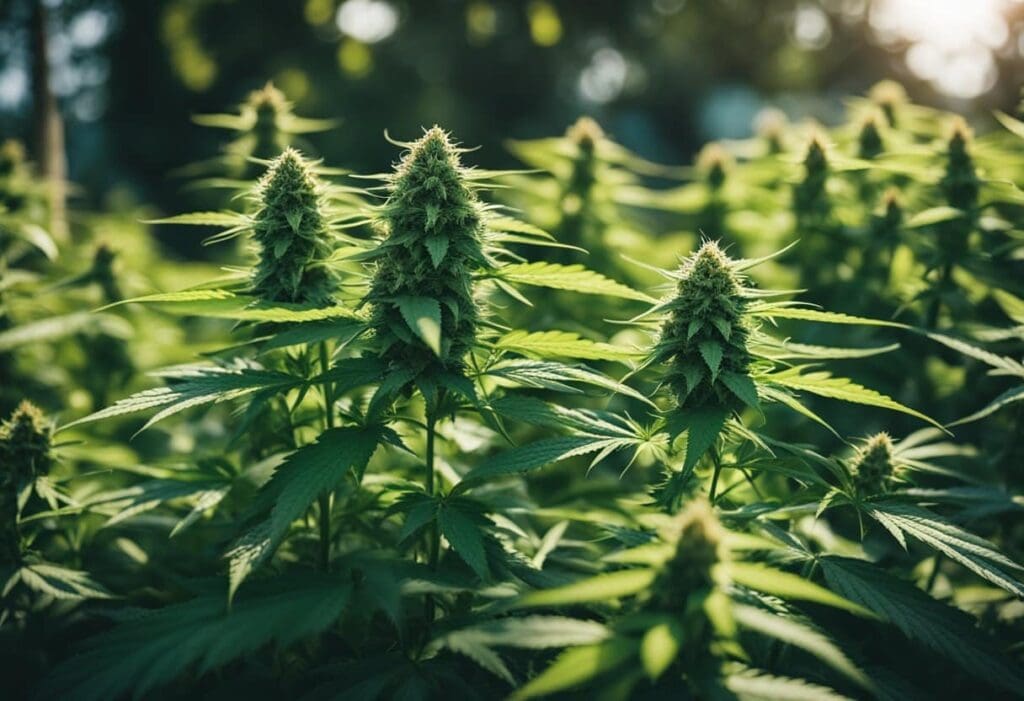Terpenes that Stimulate Appetite: Understanding Natural Hunger Enhancers
Ever smelled something so good you instantly felt hungry? Say howdy to terpenes, the scent superstars hiding in loads of plants, like the herbs in your garden, delicious fruits, and yep, even weed. These little champs are the ones pulling the strings, affecting not only how we feel but also our health. Imagine this: a whiff of certain smells could be a life-changer for folks having a tough time eating because of sickness or meds. Terpenes are the real deal in this story. The link between our noses and our tummies is a big deal. Terpenes are like the master builders of taste and smell that linger. Ever wondered why certain smells make you crave a bite? It’s thanks to the secret sauce terpenes bring to the table. Dive into this journey, and you’re on your way to discovering a world of smells and flavors that could rocket your health to new levels!

The stimulation of appetite is crucial for maintaining nutrition and body weight, especially in patients who suffer from cachexia in cancer, HIV/AIDS, or other chronic diseases. Some terpenes have been identified for their appetite-stimulating properties, including those found in essential oils like black pepper oil. These compounds may act through different mechanisms, such as enhancing the smell and taste of food, which can trigger the physiological response of hunger, or by modulating the endocannabinoid system, which is known to control hunger cues.
Investigations into the effects of terpenes are ongoing, with studies examining both their therapeutic potential and their mechanisms of action. This body of research not only explores the benefits of terpenes found in cannabis but also examines the widespread presence of similar compounds in many botanicals. Through a better understanding of terpenes and their impact on appetite, there is promise in developing natural, terpene-based therapies that could help manage appetite and improve nutritional intake.
Understanding Terpenes and Appetite Stimulation

Terpenes have the potential to influence appetite, interacting significantly with the endocannabinoid system, which plays a key role in appetite regulation.
Terpenes Defined
Terpenes are aromatic compounds found in many plants, contributing to their scent, flavor, and even therapeutic properties. Regarding appetite stimulation, certain terpenes are believed to influence this physiological response.
The Role of the Endocannabinoid System
The endocannabinoid system (ECS) is a complex network of receptors, including CB1 and CB2, that regulate various body functions. Terpenes can affect the ECS, potentially impacting appetite control.
Terpenes vs. Cannabinoids in Appetite Stimulation
While cannabinoids like THC and CBD directly interact with the ECS to influence appetite, terpenes can modulate this effect. They can enhance the impact of cannabinoids through an entourage effect, thus contributing to appetite stimulation.
Key Terpenes That Stimulate Appetite
Terpenes are aromatic compounds found in many plants, including cannabis, which may influence human behavior and physiology. Specific terpenes have been associated with stimulating appetite, commonly referred to as “the munchies.”
Myrcene and the Munchies
Myrcene, a prevalent terpene in many cannabis strains, is noted for its sedative effects and its potential to induce hunger. Often found in high concentrations in indica strains, myrcene can enhance the sensation of the munchies, encouraging increased food intake.
Limonene for Enhanced Digestion
Limonene, with its citrusy aroma, may assist not only in appetite stimulation but also in digestive health, potentially combating symptoms of acid reflux and heartburn. Its role in metabolism may be linked to a positive impact on appetite levels.
Humulene and Hunger
Although traditionally recognized for its appetite suppressant properties, humulene can be part of a synergistic effect in the presence of other terpenes that promotes hunger. It’s a key player in the entourage effect within cannabis, contributing to the overall impact on appetite.
Caryophyllene’s Dual Effects
Caryophyllene, unique for fitting into the category of both a terpene and a cannabinoid, can bind to CB2 receptors potentially influencing appetite. It may have dual effects, depending on its interaction with other compounds, sometimes stimulating hunger or helping to manage it.
Influences on Appetite Regulation
Understanding how various factors influence appetite regulation is crucial for addressing eating behaviors. This section elaborates on the roles of hormones, the gut-brain axis, and terpenes in controlling hunger and satiety.
The Impact of Hormones on Appetite
Hunger and satiety are significantly regulated by hormones such as ghrelin, which stimulates appetite, and leptin, which signals fullness. These hormones fluctuate throughout the day, impacting when and how much individuals feel the need to eat. An increase in ghrelin levels can lead to heightened feelings of hunger, whereas elevated leptin levels are associated with a sensation of satiety.
Gut-Brain Effects on Hunger
The gut-brain axis is a bidirectional communication system that links the emotional and cognitive centers of the brain with peripheral intestinal functions. This complex relationship ensures that signs of hunger or satiety are accurately communicated via neurotransmitters and hormones. Disruption in this gut-brain communication might lead to irregular appetite patterns or eating behaviors.
Terpenes and Neurotransmitter Interactions
Terpenes, the aromatic compounds found in various plants, have been studied for their role in appetite regulation through their interactions with neurotransmitters in the brain. Certain terpenes can either suppress or stimulate appetite by modulating neurotransmitter release or receptor activation. For individuals interested in the culinary side of terpenes’ influence on appetite, the best snacks to complement the effects of terpenes may enhance the overall experience.
Cannabis Strains Rich in Appetite-Stimulating Terpenes

Cannabis strains vary in their terpene profiles, affecting their potential to stimulate appetite. Some are particularly noted for their hunger-inducing effects, largely due to specific terpenes they contain.
Indica and Appetite Stimulation
Indica strains are often associated with a body-focused ‘high’ and can be particularly effective for those seeking appetite stimulation. They typically contain high levels of Myrcene, a terpene known for its relaxing effects and its role in inducing munchies. For instance, the strain Granddaddy Purple is rich in Myrcene and is widely recognized for its ability to stimulate appetite.
Sativa’s Role in Hunger
While Indicas are well-noted for their impact on the appetite, certain Sativa strains also offer appetite-stimulating properties. Strains like Blue Dream possess a balance of terpenes such as Limonene and Caryophyllene, which may enhance mood and increase hunger. The uplifting effects of Sativas often complement the appetite-stimulating terpenes they contain.
Hybrid Strains for Balanced Effects
Hybrid cannabis strains can provide a balanced effect between Indica and Sativa properties, including the potential to stimulate appetite. The terpene profiles in hybrids combine the qualities of both Indica and Sativa, which can lead to a more nuanced experience. For example, the well-crafted Runtz strains combine varied terpenes contributing to their tantalizing flavors and potential to induce hunger.
Health and Wellness Applications
The therapeutic potential of terpenes extends beyond their aromatic qualities, as they may play a significant role in health and wellness, specifically through their ability to stimulate appetite which can be crucial for individuals facing appetite loss due to various conditions.
Appetite Loss in Chronic Conditions
Patients suffering from chronic diseases often experience appetite loss, which can lead to nutritional deficiencies and impair recovery. Terpenes are being studied for their capacity to stimulate appetite and support nutritional intake in these instances. For example, they have shown promise in cases where appetite enhancement is necessary, such as in individuals struggling with anxiety and insomnia.
Cancer and Chemotherapy Support
Cancer patients undergoing chemotherapy frequently deal with severe appetite loss and weight loss, which can affect treatment outcomes. Certain terpenes have demonstrated potential as supportive agents to help mitigate these issues, thereby playing a role in comprehensive cancer care. They may aid in improving the palatability of food and help patients maintain a healthier weight during treatment.
Mental Health and Appetite Control
The relationship between mental health and appetite is complex, with conditions such as depression and anxiety often leading to decreased hunger. Integrating terpenes into treatment strategies might offer support for mental health-related appetite control. They could be particularly beneficial as a complementary approach, enhancing the effects of other treatments and improving the overall quality of life. Considering the best time for consumption may also maximize their beneficial effects on appetite, as indicated by insights on the optimal timing for taking edibles.
Therapeutic and Aromatic Terpene Products

Terpenes are organic compounds that, besides providing aroma, have been found to potentially stimulate appetite. They are integrated into various therapeutic and aromatic products to leverage this effect.
Essential Oils and Aromatherapy
Essential oils, highly concentrated extracts from plants, harness the essence of terpenes. Studies suggest that aromatherapy using essential oils like limonene and myrcene may affect hunger signals and stimulate appetite. Inhalation of these aromatic compounds distributes them to the body’s limbic system, which is involved in controlling emotions and behaviors such as hunger.
Terpene-Infused Foods and Candies
The infusion of terpenes into foods and candies doesn’t only enhance flavor but also can contribute to appetite stimulation. Products like hemp gummies provide a palatable way to ingest beneficial terpenes along with other compounds like CBD. Similarly, incorporating terpenes like those found in Delta 8 distillate with certain foods can possibly promote a healthy appetite.
Supplements and Consumer Goods
Terpenes have also found their way into supplements and consumer goods in an effort to support various aspects of health, including appetite. Products like CBD vape juices that include terpenes such as linalool and beta-caryophyllene may offer the dual benefits of providing relief and subtly encouraging an increase in appetite through their therapeutic aromas and effects when inhaled as a vapor.
Frequently Asked Questions
Terpenes and cannabinoids have been recognized for their potential therapeutic benefits, particularly in stimulating appetite and helping with nausea.
What are the best cannabinoids for enhancing hunger?
THC is well-known for its ability to increase hunger; this phenomenon is often referred to as the “munchies.” It activates CB1 receptors in the brain, which plays a significant role in hunger promotion.
Which specific terpenes are known to help with nausea and stimulate appetite?
Limonene and myrcene are two terpenes commonly associated with anti-nausea effects and appetite stimulation. Limonene has a citrusy scent and is believed to have mood-elevating properties, while myrcene has a more earthy aroma and is attributed to relaxing effects that could help with gastrointestinal discomfort.
How does myrcene affect the appetite and metabolism?
Myrcene is reported to have sedative and muscle relaxant effects which might aid in digestion and subsequently impact appetite. Additionally, it may influence the metabolism indirectly by affecting sleep and stress, which are metabolic factors.
Can CBD products be used to stimulate appetite effectively?
CBD, while not as potent as THC in stimulating appetite, has been recognized for its ability to help regulate the body’s homeostatic mechanisms which could indirectly influence hunger cues when mitigating underlying conditions like stress or pain.
Are there any cannabis strains particularly effective for nausea and increasing appetite?
Strains high in THC and the terpenes limonene and myrcene, such as OG Kush and Mango Kush, are reported to be effective for nausea and increasing appetite. Their combined properties are favored for such therapeutic uses.
What medications besides Marinol are known to increase appetite?
Marinol, a synthetic version of THC, is officially prescribed for appetite stimulation. Other medications, such as Megestrol and Oxandrolone, are also used to encourage eating in patients with appetite-loss conditions.







